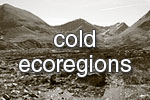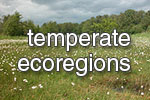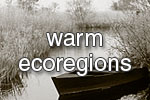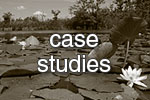Wetlands in temperate ecoregions - overview
The pristine status
Wetlands in temperate regions include a large proportion that are the result directly or indirectly of human intervention. Their diversity and often close association with human activities makes it difficult to define any truly pristine condition. Hydrological and nutrient conditions are fundamental factors determining characteristics. Species supported range from those adapted to highly acidic, low nutrient conditions to those that require circum-neutral to slightly alkaline conditions. Marked seasonal variations are typical due to variations in temperature and waterlogging, but these tend to be less extreme than in the cold ecoregions or in the Mediterranean.
Human impact
It is probable that no wetland has escaped some human impact, and throughout Europe’s temperate ecoregions, the loss of wetland habitat has been a long and progressive feature of landscape development at least since early mediaeval times. Drainage for agriculture or forestry intensification has been the single most important direct impact, followed by peat mining. Eutrophication, acidification, and regulation of water flow are the most important indirect impacts.
Climate change impact
Climate change will have a significant effect on the maintenance of all peat-dominated wetlands, and on the ability of impacted ecosystems to recover. Desiccation of wetland peats will increase oxidative losses, contributing further to greenhouse warming and the release of coloured water downstream. It is not clear what will be the implications for aquatic biota, but drier wetland surfaces will be invaded by non-wetland species, including woodland species. Changes in flooding regime will impair floodplain wetlands and affect the ways in which they can function in nutrient dynamics,or food chain or habitat support.
For further reading
- Rosset V, Lehmann A, Oertli B (2010) Warmer and richer? Predicting the impact of climate warming on species richness in small temperate waterbodies. Global Change Biology, 16, 2376–2387.
link to article - Rosset V, Oertli B (2011) Freshwater biodiversity under climate warming pressure: Identifying the winners and losers in temperate standing waterbodies. Biological Conservation, 144, 2311–2319.
link to article









